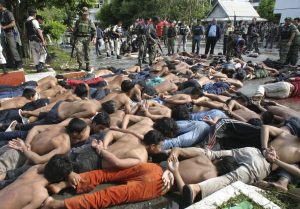Authorities in Thailand will prosecute eight former security personnel over their roles in a 2004 Tak Bai massacre, in which 85 Malay Muslim protesters were killed in southern Thailand.
In a press conference yesterday, Prayut Phetcharakhun, a spokesperson for the Office of the Attorney General, said that the use of overcrowded trucks to detain protesters was inappropriate, the Bangkok Post reported. While there was no intent to kill the detainees, he said, “the suspects could have foreseen that their actions would have led to the suffocation and deaths of the 78 people under their responsibility.”
The defendants include six soldiers and two civilians; all are charged with premeditated murder with foreseeable consequences.
The announcement follows a separate criminal complaint filed by the families of 48 of the victims from Tak Bai, against seven officials, including former high-ranking military personnel and police officers. On August 23, after years of legal wrangling, Narathiwat Provincial Court in southern Thailand agreed to accept the complaint. Both of the cases are getting started just weeks before the expiry of the 20-year statute of limitations of the case on October 25.
The cases center on an incident that took place in the town of Tak Bai in the southern province of Narathiwat on October 25, 2004. As Christian Wells wrote for The Diplomat earlier this month, the deaths occurred when a group of 2,000 protestors assembled outside the police station in Tak Bai to demand the release of six Malay Muslims who had been arbitrarily detained by Thai security forces on suspicion of providing firearms to local separatist insurgent groups.
After the protest turned violent, Thai soldiers launched a crackdown, killing seven people with gunfire and detaining around 1,370 Malay Muslim men. Of these, 78 were suffocated or crushed to death after they were stacked on top of each other in army trucks, before being transported to a military camp in Pattani province, around 150 kilometers away. Thaksin Shinawatra, then Thailand’s prime minister, expressed regret for the deaths, but he insisted there had been no wrongdoing by military personnel. The military has since brushed off calls for the prosecution of those responsible.
The Tak Bai incident is one of the deadliest incidents to have taken place during the conflict in southern Thailand, where Malay Muslim organizations are fighting for autonomy from the Thai state. The Tak Bai massacre took place nine months after the institution of martial law in Pattani, Yala, and Narathiwat provinces, in response to an upsurge of separatist attacks. The conflict in southern Thailand has since killed more than 7,600 people.
Rights activists have long argued that the Tak Bai massacre encapsulates the impunity that military personnel enjoy in the Deep South. As Isabelle Arradon, Director of Amnesty International’s South East Asia Program, put it in 2012, “It is shameful that no one has been brought to justice for these deaths, and that there is virtual impunity for other serious human rights violations in the ongoing internal armed conflict in the south.”
It remains too soon to know whether the current cases signal an end to the culture of impunity is at an end. It is certainly convenient that the courts have approved these prosecutions so close to the expiry of the statute of limitations, which, as Wells noted in his article last month, could allow the accused to evade accountability for their roles in the Tak Bai massacre. The only defendant to be named in either case is former regional army commander Pisan Wattanawongkiri, who is now a lawmaker for the ruling Pheu Thai Party.
During yesterday’s press conference, Prayut said that the attorney general had asked the police to bring the eight suspects to court for arraignment. However, he said that charges will expire if none of the defendants appears in court before October 25. This obviously creates a strong incentive for the defendants to go underground for the next five weeks, in order to prevent the case from going ahead.
Unsurprisingly, the seven defendants in the Narathiwat case were due to appear in court on September 12 but none showed up, the Bangkok Post reported. The court issued arrest warrants for all of them except for Pisan Wattanawongkiri, who has parliamentary immunity. He has been summoned to appear at its next hearing on October 15. Whether he or any of his co-defendants attend the hearing, however, remains very much in doubt.
Prayut said that the AGO received the case from police investigators in April, and that they had done their best to expedite the process, according to a report by the Associated Press. When asked why there was such a delay in issuing indictments, Prayut declined to comment, saying it was a police affair.

































